Vintage Treasures: The Hugo Winners, Volumes 4 & 5, edited by Isaac Asimov
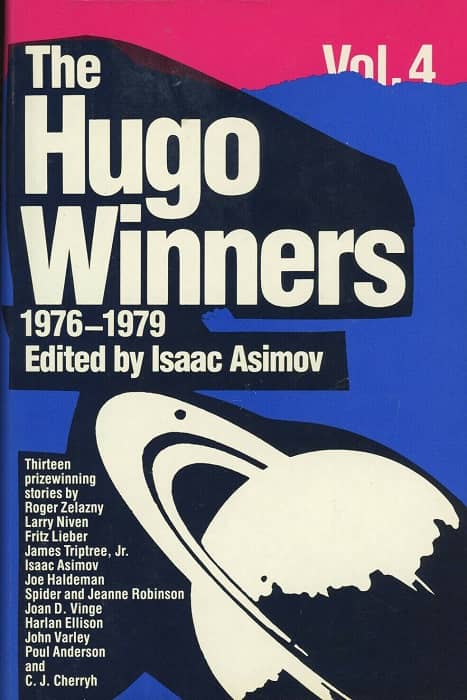 |
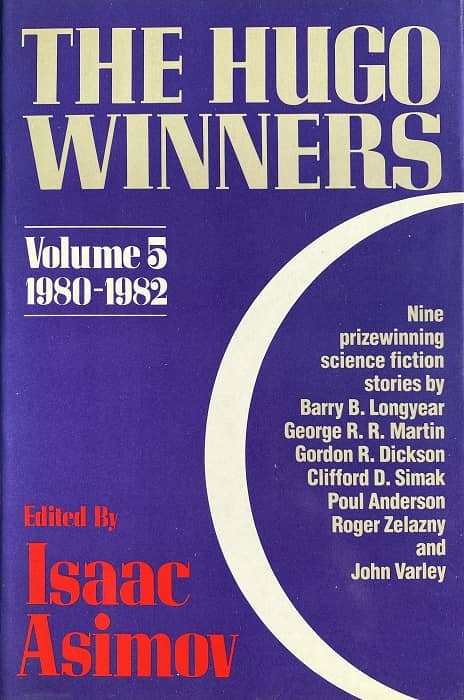 |
The Hugo Winners, Volume 4 and Volume 5 (Doubleday, April 1985 and April 1986). Covers by Kiyoshi Kanai and Tita Nasol
Last week I looked back at three of the finest science fiction anthologies ever published, The Hugo Winners, Volumes 1, 2, & 3. The first two volumes, included in my introductory order with the Science Fiction Book Club in 1976, were essentially my introduction to science fiction, and they bear much of the responsibility for turning me into a lifelong fan of SF — and especially short SF.
Asimov eventually edited nine volumes of The Hugo Winners before his death in 1992. Each was enriched with his signature breezy and light-hearted story introductions, which portrayed the entirety of the American science fiction community as a tight-knit clubhouse of friendly and brilliant eccentrics. There may have been an element of truth to that at the start (the number of Americans who made a living as full-time SF writers was surprisingly small in the 60s and 70s), but by the 80s Asimov no longer knew the majority of authors he was introducing personally, and it showed.
[Click the images for Hugo-sized versions.]
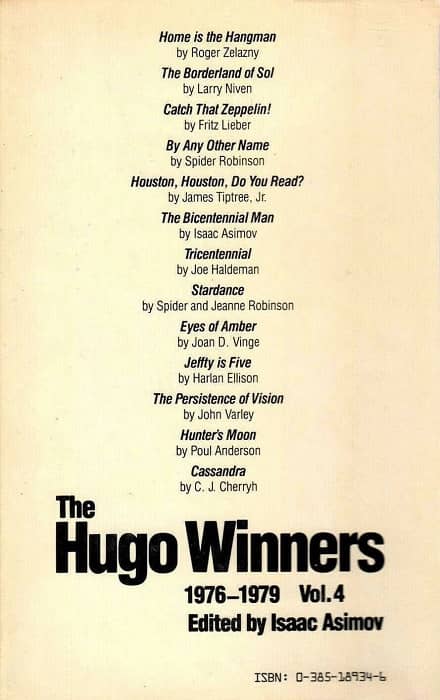 |
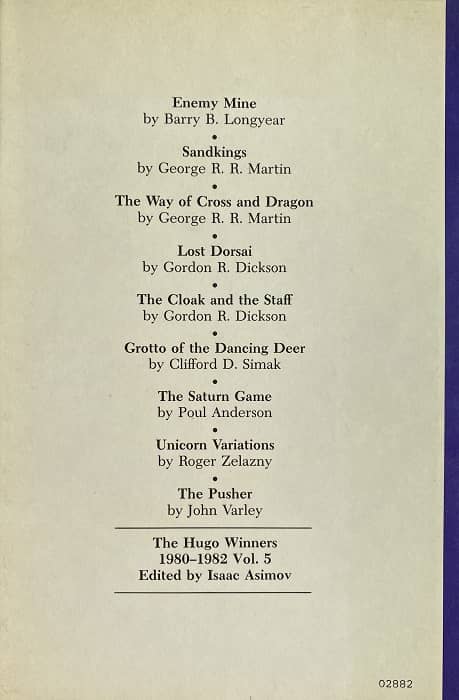 |
Back covers to The Hugo Winners, Volume 4 and Volume 5
The omnibus edition of The Hugo Winners, Volume One and Two was one of the most successful anthologies Doubleday ever published, and the Science Fiction Book Club kept the hardcover in print — and prominently featured it in its advertising — for the better part of a decade. Both volumes were also in print in paperback through the 60s, 70s, and even the early 80s (from Avon and Fawcett Crest in the US, and Penguin in the UK.)
Just based on the number of copies for sale on eBay on any given day, it’s a pretty safe bet that sales on Volume 3 were fairly brisk as well.
However it’s fairly clear that sales of the later volumes, starting with 4 & 5, were not as impressive. Both books went out of print quickly, and — especially surprising, considering the astonishing longevity of Volume One and Two — neither ever appeared in paperback, either in the US or the UK.
In fact, The Hugo Winners, Volume Five was the final one in the original sequence, and the last from Doubleday. In 1989 Asimov revamped the series with a new publisher, Wynwood Press, retitling it The New Hugo Winners. Wynwood dropped it after that first volume, and that was the end of the road for hardcover Hugo anthologies. For the next two Asimov turned to Baen, who published The New Hugo Winners, Volume II and The Super Hugos as paperback originals, both in 1992.
The declining popularity of Hugo Award-winning fiction was exactly the kind of thing that caused older fans to shake their heads, and pontificate solemnly that “SF was better in the good ole days,” and that the Hugos had become too cliquey and political (Yes, there were curmudgeons in the 80s, and they hated new science fiction then, too.)
This is hogwash. The Hugo Winners, Volume Four and Volume Five contain some of the best short science fiction ever written, including “Sandkings” by George R. R. Martin, “Jeffty Is Five” by Harlan Ellison, and Asimov’s own “The Bicentennial Man.”
Yes, there are a few selections I disagree with (I find both “The Persistence of Vision” by John Varley and Larry Niven’s “The Borderland of Sol” overrated, just to pick two examples), and there are some criminal omissions. James Tiptree, Jr’s groundbreaking 1977 story “The Screwfly Solution,” published under the name Raccoona Sheldon, is an obvious example, but there’s also Orson Scott Card’s “Ender’s Game,” Tom Reamy’s “San Diego Lightfoot Sue,” Gene Wolfe’s “Seven American Nights,” Ed Bryant’s “giANTS,” “The Moon Goddess and the Son” by Donald Kingsbury, “Nightflyers” by George R. R. Martin, “Emergence” by David R. Palmer, and Howard Waldrop’s brilliant “The Ugly Chickens,” just to name a few overlooked gems.
But none of that detracts from a modern reader’s ability to enjoy both of these volumes. Let’s face it — debating the selections has been part of the fun since Awards anthologies were invented, and these are no exceptions.
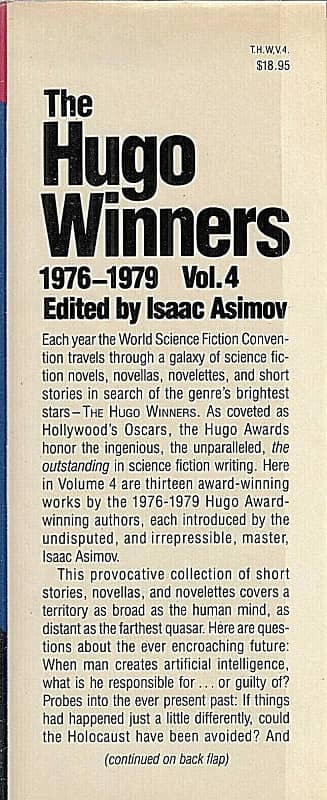 |
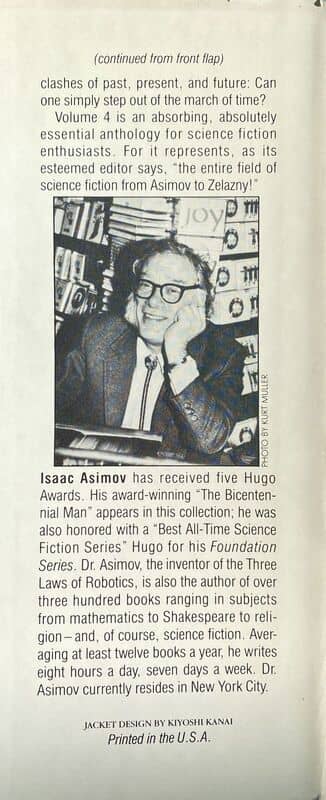 |
Cover flaps for The Hugo Winners, Volume 4
Here’s the complete table of contents for both volumes.
The Hugo Winners, Volume Four
Introduction: What Again? by Isaac Asimov
“Home Is the Hangman” by Roger Zelazny (Analog Science Fiction/Science Fact, November 1975)
“The Borderland of Sol” by Larry Niven (Analog Science Fiction/Science Fact, January 1975)
“Catch That Zeppelin!” by Fritz Leiber (The Magazine of Fantasy and Science Fiction, March 1975)
“By Any Other Name” Spider Robinson (Analog Science Fiction/Science Fact, November 1976)
“Houston, Houston, Do You Read?” by James Tiptree, Jr. (Aurora: Beyond Equality, 1976)
“The Bicentennial Man” by Isaac Asimov (Stellar #2, 1976)
“Tricentennial” by Joe Haldeman (Analog Science Fiction/Science Fact, July 1976)
“Stardance” by Jeanne Robinson and Spider Robinson (Analog Science Fiction/Science Fact, March 1977)
“Eyes of Amber” by Joan D. Vinge (Analog Science Fiction/Science Fact, June 1977)
“Jeffty Is Five” by Harlan Ellison (The Magazine of Fantasy and Science Fiction, July 1977)
“The Persistence of Vision” by John Varley (The Magazine of Fantasy and Science Fiction, March 1978)
“Hunter’s Moon” by Poul Anderson (Analog Science Fiction/Science Fact, November 1978)
“Cassandra” by C. J. Cherryh (The Magazine of Fantasy and Science Fiction, October 1978)
Looking over the TOC above, the thing that sticks out to me is the way Ben Bova’s Analog magazine dominated the voting, with more than half the winners (seven of the winning thirteen stories) originally appearing in its pages.
The Hugo Winners, Volume Five
Introduction: My Magazine, by Isaac Asimov
1980: 38th Convention, Boston, by Barry B. Longyear
“Enemy Mine” by Barry B. Longyear (Isaac Asimov’s Science Fiction Magazine, September 1979)
“Sandkings” by George R. R. Martin (Omni, August 1979)
“The Way of Cross and Dragon” by George R. R. Martin (Omni, June 1979)
1981: 39th Convention, Denver, by Gordon R. Dickson
“Lost Dorsai” by Gordon R. Dickson (Destinies, February-March 1980)
“The Cloak and the Staff” by Gordon R. Dickson (Analog Science Fiction/Science Fact, August 1980)
“Grotto of the Dancing Deer” by Clifford D. Simak (Analog Science Fiction/Science Fact, April 1980)
1982: 40th Convention, Chicago, by Poul Anderson
“The Saturn Game” by Poul Anderson (Analog Science Fiction/Science Fact, February 2, 1981)
“Unicorn Variation” by Roger Zelazny (Isaac Asimov’s Science Fiction Magazine, April 13, 1981)
“The Pusher” by John Varley (The Magazine of Fantasy & Science Fiction, October 1981)
Here at least we have a few other magazines giving Analog a run for its money, including Asimov’s own Isaac Asimov’s Science Fiction Magazine (edited by George H. Scithers), Omni (Ben Bova, who left Analog in 1978), and F&SF (edited by Ed Ferman).
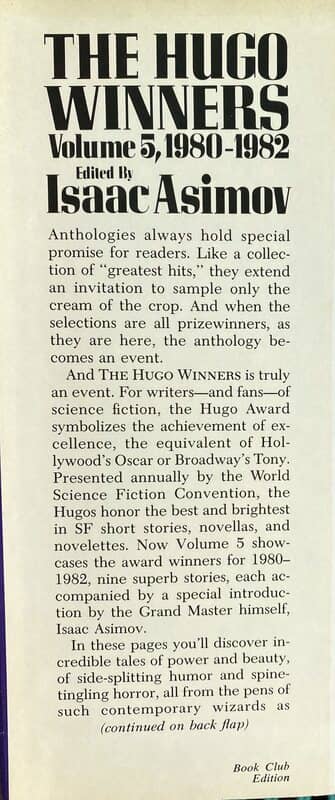 |
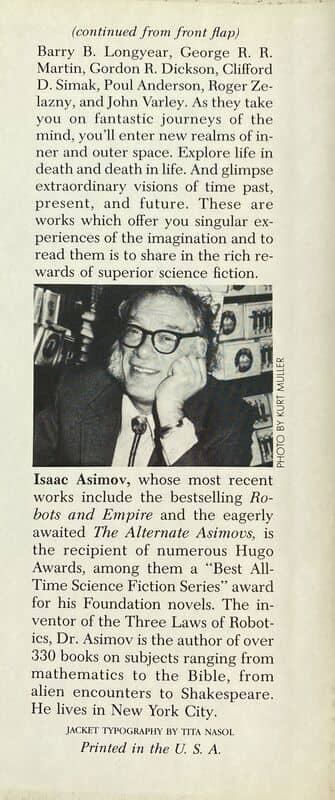 |
Cover flaps for The Hugo Winners, Volume 5
Asimov produced eight volumes of Hugo Winners (nine if you count the Science Fiction Book Club omnibus edition of the first two). Here’s the complete list, with links to our previous coverage.
The Hugo Winners (Doubleday, 318 pages, $4.50 in hardcover, 1962) — cover uncredited
The Hugo Winners, Volume Two (Doubleday, 667 pages, $9.95 in hardcover, September 1971) — cover by Alan Peckolick
The Hugo Winners, Volumes One and Two (SFBC, 849 pages, $3.98 in hardcover, January 1972) — cover by F. & J. Silversmiths, Inc.
The Hugo Winners, Volume Three (Doubleday, 622 pages, $12.50 in hardcover, August 1977) — cover by Robert Jay Silverman
The Hugo Winners, Volume 4 (Doubleday, 575 pages, $19.95 in hardcover, April 1985) — cover by Kiyoshi Kanai
The Hugo Winners, Volume 5 (Doubleday, 384 pages, $18.95 in hardcover, April 1986) — cover by Tita Nasol
The New Hugo Winners (Wynwood Press, 320 pages, $17.95 in hardcover, December 1989), edited by Isaac Asimov with Martin H. Greenberg — cover by Britt Taylor Collins
The New Hugo Winners, Volume II (Baen, 375 pages, $4.99 in paperback, January 1992), edited by Isaac Asimov with Martin H. Greenberg — cover by Bob Eggleton
The Super Hugos (Baen, 424 pages, $4.99 in paperback, September 1992) — cover by Frank Kelly Freas
After Asimov’s death in 1992, Connie Willis and Gregory Benford edited two additional volumes for Baen.
The New Hugo Winners, Volume III (1994) edited by Connie Willis
The New Hugo Winners, Volume IV (1997), edited by Gregory Benford
I hope to cover all ten anthologies in future Vintage Treasures posts here.
See all our recent Vintage Treasures here.
Mostly pretty good stories. Never much cared for anything by Spider Robinson. Didn’t like The Bicentennial Man by Asimov. I like your list of ones left off. That would make a great volune on it’s own.
Steve, Richard Lupoff edited anthologies of just that nature, the WHAT IF? series, written about on BG here and also, in part by Lupoff himself, at this blogpost among many other sites: https://socialistjazz.blogspot.com/2013/11/ffb-redux-richard-lupoff-ed-what-if.html
Thanks Todd! I was totally unaware of Lupoff’s blog post, and you’re absolutely right — that article is terrific.
Steve, Richard Lupoff edited just such anthologies, the WHAT IF? sequence of books, written about here on BG and, in part by Lupoff himself, on my blog among other sites…
Hi Todd — Apologies that your first comment didn’t post right away. As you probably figured out, anything with a URL has to be approved by the admin (me) before it goes live. Happy to do so is this case, because your link above is a great resource — many thanks!
On the topic of the WHAT IF anthologies, I just got the third one in the series, and am preparing a VINTAGE TREASURES article about all three.
“declining popularity of Hugo Award-winning fiction”
That wasn’t the problem. Speaking as someone who saw all the sales figures/history for Volumes I, IIA, IIB, III, and IV, in American paperback, the problem was that by then the mass market had dropped out of science fiction collections and anthologies, period.